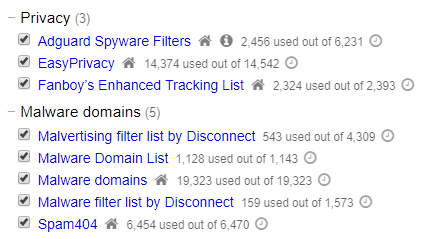Please note that this guide is an extremely simplified guide on protecting your privacy when it comes to everyday internet browsing, and DOES NOT completely anonymize your internet traffic. We will discuss this in future posts.
This article will pertain to Chrome users, but FF or other browsers should have the same or similar browser extensions. All internet users should always use these three extensions when browsing the web.
Use uBlock Origin
Online ads are pretty much one of the easiest vectors today to accidentally get a virus, malware, or a variety of other malicious software on your computer that could be tracking you or phoning home. Blocking ads is probably one of the quickest and simplest prevention methods you can do to block out a large portion of malicious content online. I might even tell you that if you’re careful with the shit you download and run a VM for testing unknown software, you could safely replace an anti virus software with a simple ad blocker.
uBlock origin is pretty much the gold standard of ad blockers today, uses the least resources compared to other blockers, and allows you to easily add additional filters for malware or privacy. Some previously popular ad blockers have been bought out by advertisers [1], allowing their ads to still go through, while competitor ads still get blocked, so it’s important you select a well vetted and trusted ad blocker.
uBlock Origin Tip
you can easily add additional malware & privacy filters that can block sites that contain malware even if you accidently do click on a malicious link online
To add additional malware filters to uBlock, right click the uBlock icon that gets added to the address bar after it’s been installed, and select Options, then navigate to the 3rd-party filters tab. Under Malware filters, select all the available filters. From this page you can also enable additional filters, like Privacy filters which are recommended.
Use Privacy Badger
Have you ever wondered how some ads are specific to what you may have been previously searching? This is because of cookies, and online tracking. Cookies are generally harmless, and just simple text files stored on your computer. Websites may leave cookies for many reasons, for example, say you’re visiting a popular online fast food website, and type your zip code to select your nearest location, this website will now leave a cookie with your zip and location, so the next time you visit the site, it already knows your nearest store, all without the need for you to login or through any other complex methods. Now say another website comes along, and can easily pick up this cookie, now it knows your zipcode, and any other information that may have been left on that cookie. Many websites and trackers can very easily abuse cookies, making them a easy way to track many aspects of your browsing history. This could be used to serve you more targeted ads, or even build a pretty solid profile of you through your browsing history.
Come Privacy Badger, an extension made by the EFF, automatically and intelligently blocks trackers that may be trying to track you online.
Use HTTPS Everywhere
Another extension made by the EFF, HTTPS Everywhere automatically forces secure HTTPS connections rather than unsecure HTTP connections that can easily be hijacked or monitored. This protects you from very simple MITM attacks. If you’re using an HTTP connection, especially without a VPN, always assume that your complete internet traffic is being monitored. HTTPS Everywhere helps to avoid this issue, without you have to constantly worry if you’re on a secure connection or not.
Does this completely protect my internet traffic online?
Absolutely not. Your ISP, government agencies, hackers, and other malicious parties can still intercept your traffic in a variety of ways, but this is a barebone must have essential kit when browsing the internet today. We will discuss more robust measures to completely anonymize your internet traffic in later posts.
